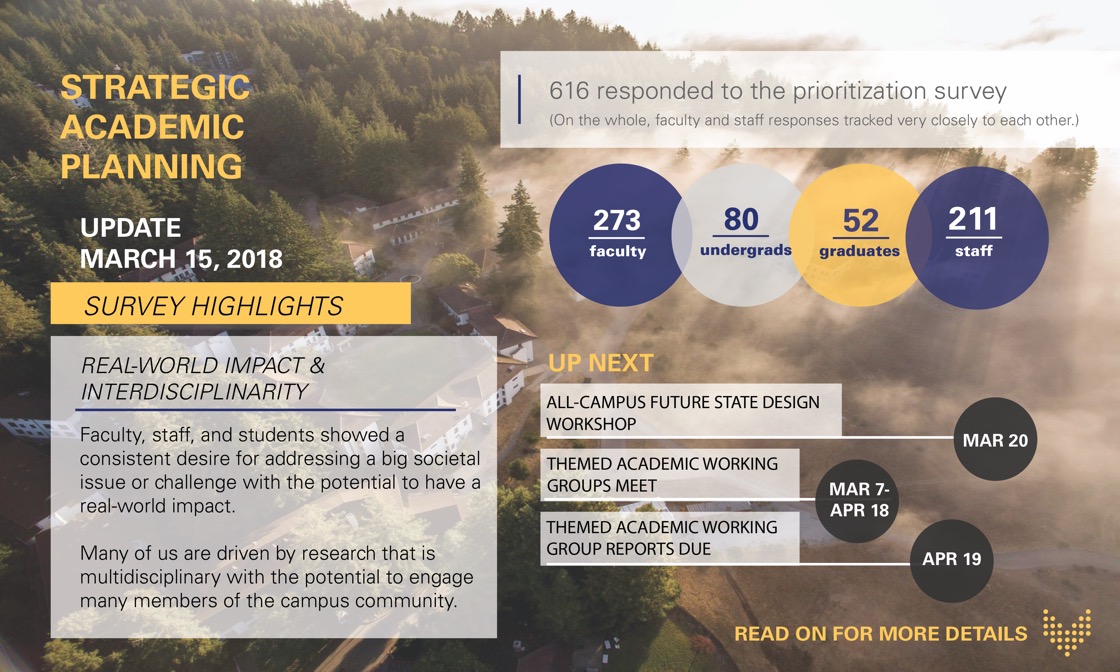Campus News
SAP update: survey results, themed groups, and upcoming workshop
Survey Results We’ve seen great results with our prioritization survey, with 616 individuals responding: 273 faculty, 211 staff, 80 undergraduates and 52 graduate students. The survey polled the campus on the most important criteria by which to assess the proposals that emerge from our Themed Academic Working Groups. Faculty, staff, and students showed remarkable alignment […]
Survey Results
We’ve seen great results with our prioritization survey, with 616 individuals responding: 273 faculty, 211 staff, 80 undergraduates and 52 graduate students. The survey polled the campus on the most important criteria by which to assess the proposals that emerge from our Themed Academic Working Groups. Faculty, staff, and students showed remarkable alignment in their desire to promote research areas “addressing a big societal issue or challenge with the potential to have a real-world impact” and ones that are “multidisciplinary with the potential to engage many members of the campus community.” These two criteria enjoyed the strongest support.
Preliminary analysis illustrates breakdowns along divisional lines and roles. Faculty and students in Engineering rated the “potential to generate resources” as the single most important factor. The same groups in Arts and Humanities assessed “resource generation” much lower and emphasized the importance of “advancing diversity in research and teaching.” Physical and Biological Sciences deemed nothing more important than “areas in which the campus already has strength or is recognized,” while Social Sciences responses were close to the average with noticeable spikes emphasizing “diversity” and “areas in which UC Santa Cruz can make a unique contribution.”
Faculty rated the criteria “in an area in which the campus already has strength or is recognized” almost as highly as they rated “multidisciplinary.” The responses of undergraduate and graduate students closely tracked with faculty and staff for the top-rated criteria, but undergraduates also highly valued “resource generation” and “innovations in teaching and learning,” while grad students stressed the importance of “advancing diversity.”
Here is a snapshot of our preliminary results. A copy of the survey is available here.
Themed Groups
The CP/EVC’s staff set up 60 initial meetings for Themed Academic Working Groups on Wednesday through Friday of last week. The groups came together to begin (or continue) conversations on how they could effectively collaborate on shared research interests and advance the research and teaching mission of the university. We look forward to seeing the final reports the groups produce by the April 19 deadline. For more information on the timeline for submission and review of the proposals, visit the SAP website.
While the themed groups have occupied much attention over the past month, it’s important to bear in mind they are only one aspect of a larger planning process. At the upcoming Future State Design workshops, we will talk about advancing diversity, preparing students for the job market, student success, sustainability, and other issues of paramount importance to the campus. See below for more details.
Upcoming
We will host an-all campus Future State Design workshop on Tuesday, March 20, from 1:30-5 p.m. in 108 Digital Arts Research Center. The workshop will ask participants to suggest, refine, and debate the “design principles” that will guide our trajectory over the next five years. Design principles are clear, tightly defined guidelines that identify a set of institutional aspirations. So, for example, some potential design principles might include: “Drive research and creative work that transforms our world,” and “Prepare students to make an impact in a changing world.” Please register by Thursday, March 15, to join the conversation.
Feedback
As always, please ask questions and make suggestions. Reach us via email or our electronic suggestion box. We read each and every comment and suggestion submitted, and do our best to respond to all inquiries.
